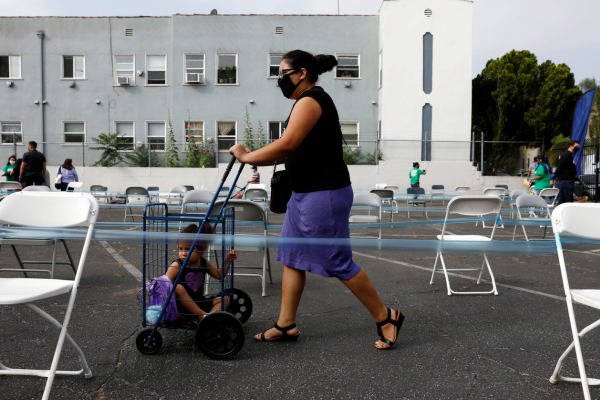It can be difficult to remember, especially during a contentious election year, but bipartisan legislation to promote the common good is always possible. And just as hard to remember: People with different ideological goals – including conservative and progressive Christians – can work together to pass good legislation. Yes really.
This week, the House voted by an overwhelming majority of 357-70 to pass a bill that includes support for low-income families with multiple children. If adopted in the Senate, the “Tax Relief for American Families and Workers Act“will improve the child tax credit by expanding eligibility and adjusting payments for inflation, provisions that would benefit approximately 16 million children in low-income families, raising 400,000 children above the poverty line.
As a father of two preteen boys, I know firsthand that becoming a parent transforms every aspect of daily life, from your sleep schedule to your financial priorities; according to an estimate, it costs nearly $240,000 to raise a child from birth to age 18 — a cost that doesn’t include helping that child pay for college. Like many parents, I feel a sacred responsibility to ensure that my children have what they need not only to survive, but also to prosper.
The apostle Paul emphasizes this responsibility in his first pastoral letter to Timothy, writing that “whoever does not care for his loved ones, and especially for his own household, has denied the faith and is worse than an unbeliever” (1 Timothy 5 : 8). ). And as we know from social science, the challenges of fulfilling this responsibility are most acute during the first three years of a child’s life, when a lack of care, nutrition or stimulation can delay the full development of his brain and sabotage his future. The CTC provides a crucial lifeline of additional financial support for the many parents and families facing adversity when caring for their children.
For several years, religious leaders and anti-poverty advocates All parties and ideologies expressed support for the renewal of the expanded CTC. Moderate and conservative Christian organizations—including the National Association of Evangelicals, Susan B. Anthony Pro-Life America, and the Southern Baptist Convention’s Ethics and Religious Liberty Commission—have argued that the expansion of the CTC is favorable to family, parents and life. Through my own work at Sojourners, I have joined other faith leaders in the Circle of Protection – a diverse coalition of faiths and Christian organizations including Catholics, evangelicals and mainline Protestants – in calling on Congress to expand the CTC.
As you might expect in a bipartisan tax bill, some compromises have angered both ends of the political spectrum: While it’s still a win for low-income families, the plan won’t as far back as the initial expansion of the CTC. in 2021, which helped cut child poverty in half. Likewise, the plan relaunches three tax breaks for businesses Favored by many Republicans and some Democrats, but opposed by some members of the far-right Freedom Caucus.
While I would like to see even greater support for low-income families in future legislation, I look forward to seeing this bill pass the Senate. The bill will face serious objections, including Republican complaints that the bill amounts to “social assistance in cash” or a government-imposed redistribution of wealth from people who pay income taxes to those who do not. Other opponents of the bill have argued that government spending is simply too high or that we simply cannot afford programs like the CTC (even though the program would be paid for by ending an outdated business tax credit); that credit could be exploited by undocumented immigrants (a claim rejected by the House Committee on Taxation); or that the credit would encourage some parents to quit their jobs or stop looking for work (an argument that even conservative newspaper columnists National review refute). Unfortunately, some senators’ votes will come down to cynical, short-term political calculations. Senator Chuck E. Grassley (R-Iowa) argued that “passing a tax bill that makes the president look good – sending checks before the election – means he could win re-election, and we won’t extend the 2017 tax cuts “.
In order to overcome these objections and galvanize sufficient political will behind the bill, I urge Christians across the theological spectrum to join me. by expressing your strong support for the bill from a moral point of view. As Christians, we believe that parents play a key role in providing their children with what they need to thrive, but we also know that this sacred responsibility does not fall solely on parents. In Matthew 25, Jesus says that the way we treat the most vulnerable people in our society is the same as we treat Jesus himself, emphasizing that we have a collective responsibility to ensure that everyone, including children , can flourish. This shared responsibility means that families, communities, congregations, charities and, of course, government have an indispensable role to play.
Some Christians balk at the idea that government has a role to play in the common good, but it is an idea rooted throughout Scripture: for example, in Romans 13 Paul writes that authorities are responsible for restraining evil and promoting the common good. It is difficult to imagine a policy that furthers the common good more than helping to ensure that every child fully receives the care they need and can achieve their full potential.
By expanding the child tax credit, Congress has a critical opportunity to provide real help to millions of families and children. As Proverbs 3:27 tells us, “Do not withhold good from those to whom it is due, when it is in your power to do.” »At a time when so many are still struggling, we must work together to ensure the Senate does not deprive families and children in need of the incredible good of an improved CTC.


